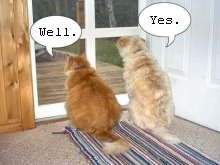The other day John Stossel gave a talk in a small auditorium at Northern Michigan University. A sign on the wall indicated capacity for the room was 487 persons. There were at least that many, people of all sizes and ages, from the blue-fingernailed to the blue-haired, from the spiky-haired to the sharply dressed with a thin red tie. They were crammed into every seat rising like a crescendo to SRO conditions in the back. Stossel arrived through a back door straight from the airport and received a standing ovation as he walked down a side aisle to the stage. Except for the fact that he was an investigative reporter on some TV news show, I knew nothing about him.
During his introduction I learned: he’s written books; worked the consumer beat for 20/20 and other TV shows; has won 19 Emmy awards; has a syndicated column which runs in the local paper; graduated from Princeton University in 1969 with a BA in psychology.
I took an immediate liking to the guy when he started off by telling us that he knows some people know exactly what they want to do in life, but that “that really creeped me out when I was in school.” Stossel said he didn’t know what he wanted to do when he left college and while applying to grad schools decided to take a free ride to Oregon to interview for a reporter position, and there it began.
“Working was much more fun (than school), and they paid you.”
He told anecdotes of starting out as a consumer reporter busting advertisers who made false claims (can all brands of aspirin really be proven to be most effective?), and soon he saw government regulations growing and thought that was good, thought that was necessary. But somewhere down the line he began to shift, began to see the rules and regulations as a burden, as a drain on creative energy and innovation. Now he believes strongly in “raw competition,” believing that a free, unregulated market is the consumer’s best protection.
“John Henry never said ‘Give me absolute safety or give me death,’” Stossel declared.
A tall, thin man with a narrow face, Stossel, who now lives in Manhattan, has slightly graying thick dark hair and a thick moustache. He wore a red, long sleeved T-shirt underneath a black suit jacket with black pants. Although strongly opinionated – legalize drugs and prostitution, deregulate markets, allow price gouging – he does not seem unduly set in all his opinions, admitting that there are still some things he’s trying to figure out. And this is what I liked about him – he obviously has strong views, but those views evolved over time and experience. And they are, at least to a certain extent, still evolving.
One thing he claims to be trying to figure out is what he sees as some kind of innate hatred of business, despite the fact that most of life consists of voluntary business transactions in which people seem to be happy, saying “thank you” to one another. Buy a cup of coffee, he said, and you’re thanking the coffee seller and the coffee seller’s thanking you, the coffee buyer. Isn’t everybody happy? Stossel has been accused of being a conservative, but he counters that he’s a “liberal turned libertarian.”
Stossel’s talk was engaging. He looked at his audience more often than his notes, and his audience responded with a seemingly unabashed fondness, often clapping and laughing at his anecdotes and pithy comments. (“When they said Northern Michigan, I didn’t know they meant NORTHERN Michigan …” was a crowd pleaser.) And he also knew about NMU’s recent proposal that would require smokers driving through campus to keep their car windows closed – a perfect example of good intention run absolutely amok. (For clarification, see NMU’s 2008 Smoking Survey Results.)
One of his few visual displays was a chart, “Days Off Your Life.” It delineated the risk of certain things we tend to be scared of – airplane crashes, terrorism, second-hand smoke – by showing us exactly how many days each of these fears is likely to shave off the average person’s life. (I admit that the means of how these days were figured was unclear to me.) The number one thing likely to reduce one’s life span? Poverty. Second-hand smoke? Negligible. Terrorism? Three days off your life.
“Frankly, as I was driving out here, I can’t believe you’re much worried about terrorism,” he said. The crowd chuckled. But apparently some people are very worried about cigarette smoke drifting out of a car window.
During a question-and-answer period, Stossel was momentarily thrown by a man who wanted to give Stossel the shirt off his back. “What?” the dapper Manhattanite asked. A softly rounded fellow with scraggly grey hair flowing down his back and a face buried under a massive grey beard sauntered toward the stage and pulled off his T-shirt. (Fortunately, there was another shirt underneath.) Without missing a beat, he climbed on stage and handed Stossel the shirt, which was inscribed “Politically incorrect and dangerous.”
Someone asked Stossel about gun control laws. He started relaying some story about Al Sharpton and people in cities being aghast at the thought that anyone might be allowed to carry a concealed weapon, though in many states it is legal, though he wasn’t sure about Michigan…
“I have one with me,” the questioner piped up, explaining that she was a 35-year-old woman commuting 78 miles to campus and you bet she’s going to protect herself.
When it was over I left by the nearest door. The late afternoon sun shone on a yet cold, snow-covered last day of winter. Stossel came out another door. He stopped to have his picture taken with a fan. I wondered where he was flying off to next. Another college in the middle of nowhere? Back home to NYC? I don’t agree with everything he said, but he was thought-provoking. And he reminded me of one reason I moved here: Fewer rules.




